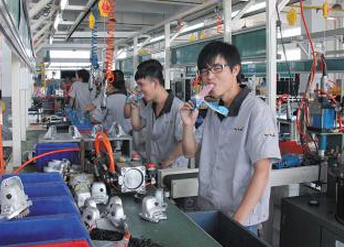(单词翻译:单击)

One day in 1995, back when the land line and the postage stamp were enjoying their last hurrah, I put in a call to directory inquiries. In those days, if you didn’t know a phone number, you dialled 192 and a human being looked it up and read it out to you. On that particular day, the woman at the other end answered the phone with: “Directories, Michelle speaking.”
1995年,在那个固定电话和邮票正享受最后狂欢的时代,有一天我给查号台打了个电话。当时,如果你不知道一个电话号码,你可以拨打192,会有人为你查到相应电话号码并念给你听。那天,电话另一头那位女士的应答是:“查号台,米歇尔(Michelle)为您服务。”
Perplexed, I asked why she had just told me her name. She said it was a new policy designed to make the service more personal. How vulgar, I thought. How gratuitously chummy. How American. I turned to the hulking cathode ray tube that sat on my desk and bashed out a column protesting that I didn’t want personal. I just wanted a phone number.
这个应答把我弄懵了,我问她为什么要告诉我她的名字,她说这是一项新政策,旨在使服务更人性化。当时我想,这种做法真是太没品位,太温情泛滥,太美国化了。我转身打开书桌上笨重的日光灯,攒出一篇专栏文章,抗议说我不想要“人性化”服务。我要的只是个电话号码。
After nearly two decades spent bobbing about on the rising tide of gratuitous chumminess, I no longer especially mind when people like Michelle introduce themselves. There are bigger things to worry about.
近20年来这种温情泛滥的做法越来越流行,到如今,对于米歇尔这类做自我介绍的人,我不会那么在意了——还有许多更重要的事让人操心呢。
The other day I bought a grey dress on eBay. When it arrived (a little too big and frumpy, but that’s always the danger with eBay) a card fell out. “We hope you had a nice and relaxing holiday break and enjoy the new dress you’ve purchased,” it said. “Have an awesome week and we look forward to serving you again in the near future. Simon and Laurie.” Things have gone rather wrong, I reflected, when Simon and Laurie, whom I have never met or even heard of, are more solicitous about my happiness and wellbeing than members of my own family.
那天,我在eBay上买了件灰色外衣。衣服送到时,我发现尺码有点大,样式还有点过时。不过在eBay上买东西,总是要冒这种风险的。然而,打开包装时一张卡片掉了出来。上面写道:“祝您度过美妙、轻松的假期,希望您喜欢您刚刚购买的新衣服。”接着,卡片上写道:“祝您拥有精彩至极的一周,期待着在不久的将来能再次为您服务。西蒙(Simon)和劳里(Laurie)敬上。”事后回想,令事情变得更糟的是,西蒙和劳里这两位陌生人——我从来没见过他们,也没听说过他们的名字——竟然比我的家人更关心我的快乐和健康。
A couple of days later I was online trying to cancel my subscription to Sky Go and found myself having a “Live Chat”, which involves typing words into a bubble. “Hello Lucy. How are you today? ;)” Ajay typed. “Fine,” I typed back. “Cool! ;) I’m certain I can help you with this.”
几天后,我上网想取消在Sky Go的订阅,结果经历了一次“在线聊天”。在这个过程中,输入的语句会显示为一个一个的泡泡。“你好露西,今天感觉如何?;)”阿杰伊(Ajay)说道。“不错。”我回道。“棒极了!;)相信我能帮到你。”
After a further snowstorm of smiley faces and professions of willingness to help, it emerged that he couldn’t. “I hope that was helpful ;). Take care!” he signed off.
他接着甩出大把的笑脸表情,并发出一连串乐意效劳的职业化语句,但事实证明他帮不了我。他发了句话:“希望这些对你有帮助;)。万事小心!”接着就下线了。
This exchange was relatively chilly by comparison to a live chat posted on Reddit from an Xbox user with an employee called Kelly, who at one point typed: “You’re such an understanding person. I wish I can give you a cup of coffee or cold Mountain Dew for that!” No doubt Kelly thought – like Michelle – that she was just making the service more personal. In fact, she was making it borderline sinister.
比起Reddit网站上一位Xbox用户贴出的在线聊天记录,这次对话算是相对冷淡的。与该Xbox用户对话的是一名叫凯莉(Kelly)的员工,她打了这样一句话:“您真是善解人意。就冲这话我都想请您喝杯咖啡或冰镇激浪(Mountain Dew)了。”毫无疑问,凯莉的用意和米歇尔一样——她只是想让服务变得更人性化。而事实上,她的做法让她的服务都近乎邪恶了。
Twenty years ago the insincerity of “have a nice day” used to rankle. But now even “have a great day” sounds lukewarm as any day less than “awesome” is not deemed worth wishing for. Equally, “no problem” (always maddening as there nearly always was a problem) became “no problem whatsoever”, or NPW – in order to avoid the problem of having to type out three whole words.
20年前,“祝您今日愉快”这样一句话中所包含的不真诚往往会让人不舒服。而在今天,就算是“祝您拥有灿烂美好的一天”听上去也平淡了些,因为如今任何够不上“精彩至极”的一天都不值得用来祝福。同样,“没问题”(这句话总是令人恼火,因为差不多每次都会出问题)也变成了“绝对没问题”——为了避免要敲三个单词的麻烦,这个词被缩写成了NPW(No problem whatsoever的简写,译者注)。
There is a rule about corporate chumminess that companies seem not to have worked out. Unless solicited by an equally matey customer, it is a bad idea. Scripted chumminess is particularly bad, as even the most moronic client can tell the difference between real and fake. The worst sort of chumminess is when the person is either failing to solve your problem or is cold calling you. All emails from PR people hawking stories that begin “I hope this email finds you well” or “I hope you are enjoying this excellent weather we’ve been having” I instantly delete without reading on.
那些大公司似乎都没考虑到企业秀温情的一条准则:如果服务请求不是同样热情的顾客主动发出的,这么做其实是个坏主意。而照本宣科式的秀温情尤其糟糕,因为即使是最迟钝的顾客也能区分出真实和虚假的情感。有两种情况是最糟糕的,一种是服务人员没有解决你的问题,一种是他跟你说话语气冷冰冰的。至于我自己,对于所有发自公关人士、所兜售的故事以“希望看到这封电子邮件时您心情不错”或“希望您也在享受我们一直享有的绝佳天气”这类句子开头的电子邮件,我都会在第一时间看都不看地删掉。
Chumminess is only acceptable when it feels natural and when it’s not too blatantly self-interested. Simon and Laurie’s good wishes were a little incontinent in their friendliness, but were so amateurish they felt quite sweet. For big, faceless corporations, getting the personal touch right is far harder.
温情只有在感觉自然并且功利性不过于明显的情况下才会被人接受。在西蒙和劳里的美好祝福中,他们要表达友好却没有掌握好度,不过尽管很业余,他们还是令人觉得相当温馨。而对于规模较大却缺乏名气的企业来说,要恰当地与客户进行个人化的交流要困难得多。
J Sainsbury has been trying to teach the people who man its social networks to be pally in just the right way. A few months ago a customer tweeted: “I tried to buy some battered fish from @sainsburys but it didn’t have a bar cod!” The company replied: “Were there no other packs in the plaice, or was that the sole one on the shelf? Floundering for an explanation! David.” More fish puns followed and the company was so pleased with the exchange it put out a press release.
森宝利(J Sainsbury)超市集团在为其社交网络培训人员时,一直力图教会他们如何以正确的方式表现得亲密。几个月前,一名顾客发了条tweet:“我想从@sainsburys买点炸鱼,但是那上面没有条码!”森宝利回复说:“‘比目鱼(plaice,这里通place,译者注)里’再没别的了么,还是架上只有一包了?游(原文里flounder既有努力移动之意,也有比目鱼之意,译者注)出来解释一下!戴维(David)。”跟帖中出现了更多与鱼有关的双关语。该公司觉得这次对话十分有趣,还作为新闻稿发布出来。
There was another time when a woman tweeted from a Sainsbury’s car park that she was trapped with a sleeping baby and longed for coffee. The social networking team tracked her down and got someone to take her some. Another cute story. The personal touch on social networks triumphs.
还有一次,一位妇女在森宝利的停车场发tweet称,正在睡觉的宝宝令她脱不开身,而她又很想喝杯咖啡。森宝利的社交网络团队查明了她的位置,让人为她带了咖啡。这又是一个温馨的故事。社交网络上的个人化联络取得了成功。
Only there is a small catch. If we all asked for free coffee in car parks we wouldn’t get it. The primary point of a business is not to befriend people on Twitter by giving stuff away. It is to sell things that people want to buy.
不过,这故事里有一个小问题。如果我们全都在停车场索要免费咖啡,我们就喝不到这样的咖啡了。企业的首要目标不是通过送东西在Twitter上和人交朋友,而是出售人们想要的商品。


